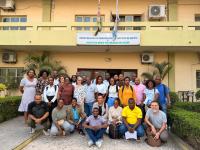Angola strengthens preparedness measures for Ebola outbreaks
Following the declaration of the Ebola virus disease outbreak in the Democratic Republic of the Congo, Angola is intensifying surveillance, prevention, and preparedness measures against the disease, particularly in Lunda Norte province, which borders the DRC.

Following the declaration of the Ebola virus disease outbreak in the Democratic Republic of the Congo, Angola is intensifying surveillance, prevention, and preparedness measures against the disease, particularly in Lunda Norte province, which borders the DRC.
A multidisciplinary team composed of experts from the National Directorate of Public Health, the National Institute of Health Research, the World Health Organization (WHO), and the United Nations Children’s Fund (UNICEF) visited the Tchissanda, Fortuna, and Nachire border posts in Lunda Norte. The mission aimed to assess and support the implementation of preparedness measures by local health authorities, as well as raise community awareness about Ebola, its symptoms, the importance of early reporting of suspected cases, and ways to stay safe.
The team delivered training in key areas such as the identification of Ebola virus disease, infection prevention and control, active case detection, community and point-of-entry surveillance, sample collection and transport, and risk communication — including strategies to address rumors and misinformation.
In total, 140 staff members, including healthcare professionals, community mobilizers, police officers, and border authorities, took part in the training sessions.
“The Ministry of Health’s priority is to ensure early detection, adequate treatment of cases, and above all, the protection of our communities and frontline health workers,” said Dr. Eusébio Manuel, Head of the Hygiene and Epidemiological Surveillance Department at the Ministry of Health of Angola. “We are firmly committed to strengthening Angola’s preparedness against Ebola.”
In addition, more than 150 traditional and religious leaders, midwives, hunters, and traditional healers from five municipalities in Lunda Norte took part in preparedness activities. These efforts also aimed to build community trust and align the local response with municipal preparedness and action plans, ensuring a coordinated and effective response.
“Preparing now means saving lives later. Every trained worker and every informed community increases Angola’s ability to respond effectively if the virus crosses the border,” said Dr. Noémia Silva, WHO officer for surveillance and immunization in Lunda Norte province.
The WHO assesses the public health risk posed by the outbreak in the Democratic Republic of the Congo as high at the national level, moderate at the regional level, and low at the global level. The Organization is working with national authorities in 10 priority neighboring countries of the DRC to initiate preparedness assessments and contingency planning.



